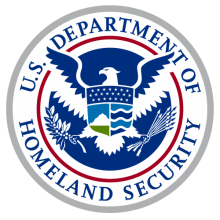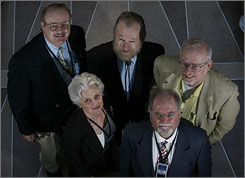Science fiction in the national interest
 USA Today writes about an interesting initiative of the US Department of Homeland Security ( DHS ; in our press this organization is more often called the US Department of Homeland Security), which decided to shift the most important task of forecasting, and therefore preventing possible future terrorist acts on the shoulders of people who, according to their own words, most of his life is spent in the future - on science fiction writers. To this end, a working group of five fairly well-known authors was created under the leadership of Arlan Andrews, an adviser for science and technology at the White House, and co-author of many reports written for the speeches of George Bush on this topic.
USA Today writes about an interesting initiative of the US Department of Homeland Security ( DHS ; in our press this organization is more often called the US Department of Homeland Security), which decided to shift the most important task of forecasting, and therefore preventing possible future terrorist acts on the shoulders of people who, according to their own words, most of his life is spent in the future - on science fiction writers. To this end, a working group of five fairly well-known authors was created under the leadership of Arlan Andrews, an adviser for science and technology at the White House, and co-author of many reports written for the speeches of George Bush on this topic.As many have recalled, the commission investigating the tragedy of September 11 concluded that the main reason for it was the “lack of imagination” from the government and special services. This deficit must be filled and invited writers should promise that soon there will be no even the most insane scenario of terrorist attacks, which they would not have thought through in advance.
DHS is the most powerful force and intelligence structure, which, according to the famous Patriotic Law (PATRIOT Act), has virtually unlimited possibilities to deal with threats to America both domestically and abroad (in collaboration with the CIA, the NSA and other US foreign special services). After it was formed in March 2002, the Department absorbed organizations that existed long before it, such as the Coast Guard and the Secret Service, and also produced many other units within itself, putting under control almost all aspects of the life of the state. That is why the idea of getting writers to work, which will largely determine the future strategy of DHS actions, seems even more original and unusual.
However, this case is not the first, even in the modern history of the United States. In 1992, the same Andrews, together with a retired colonel (and also a writer and presidential adviser) Doug Beeson (Doug Beason) assembled a group of science fiction writers and futurologists (besides them included Greg Bear, Gregory Benford, David Brin, Charles Sheffield, Stan Schmidt and Vernor Vinge) to advise various government agencies on strategic development and security planning.
')
Under the name Sigma Group, gradually changing its composition, but keeping at the heart of Andrews and Beer, this group worked with the most serious institutions. For example, in the late 90s, its participants held a series of security conferences at Sandia National Labs, one of the two largest US nuclear centers, where Andrews was a researcher at the time. The credibility earned allowed Buffalo to later become director of risk reduction at the nuclear center in Los Alamos. Beer, who wrote a best-selling book about FBI agents, gave lectures at the Academy Bureau on the fight against future bio-terrorists.
However, even without this, all Sigma members did not have the universal respect and reputation of visionary and competent specialists in many fields of knowledge. In an interview with USA Today on the occasion of hiring in DHS, Andrews said that the presence of at least one doctoral degree was a prerequisite for admission to the group, although more often than not the candidates turned out to be more. And no wonder, because to become a successful science fiction author you need to be an extremely erudite person with a pronounced analytical mindset.
 In the early 1980s, some members of the group were members of the Reagan Administration's Civil Space Consultative Council, during which they prepared the famous SDI report, which began the history of the Star Wars of the American government against the USSR (during this, to a greater extent economic, confrontation, as many Western historians believe, and the last decisive battle in which the USSR lost the Cold War passed. A big fan of Reagan, George W. Bush, is now actively reviving the very idea in his missile defense system, and it’s probably partly why it was decided to re-offer cooperation to people who have proven themselves so well in the past. In the current squad, Sigma includes Jerry Pournelle, Sage Walker, Larry Niven, and Andrews and Beer already familiar to us (in the photo the first three in order from left to right in the top row, the rest in the bottom ).
In the early 1980s, some members of the group were members of the Reagan Administration's Civil Space Consultative Council, during which they prepared the famous SDI report, which began the history of the Star Wars of the American government against the USSR (during this, to a greater extent economic, confrontation, as many Western historians believe, and the last decisive battle in which the USSR lost the Cold War passed. A big fan of Reagan, George W. Bush, is now actively reviving the very idea in his missile defense system, and it’s probably partly why it was decided to re-offer cooperation to people who have proven themselves so well in the past. In the current squad, Sigma includes Jerry Pournelle, Sage Walker, Larry Niven, and Andrews and Beer already familiar to us (in the photo the first three in order from left to right in the top row, the rest in the bottom ).In general, almost all writers from Sigma can be considered examples of the American intelligentsia: people from military families, graduates of prestigious universities and patriots to the bone. And although some of them are not enthusiastic about the militant actions of the current administration, they still try to do everything possible to “save civilization,” according to Niven. As far as they succeed, time will tell.
Source: https://habr.com/ru/post/9315/
All Articles